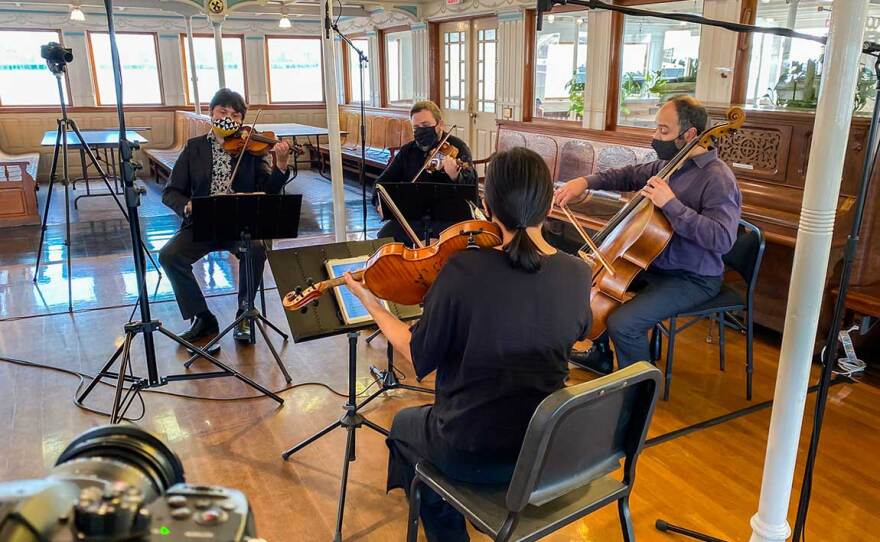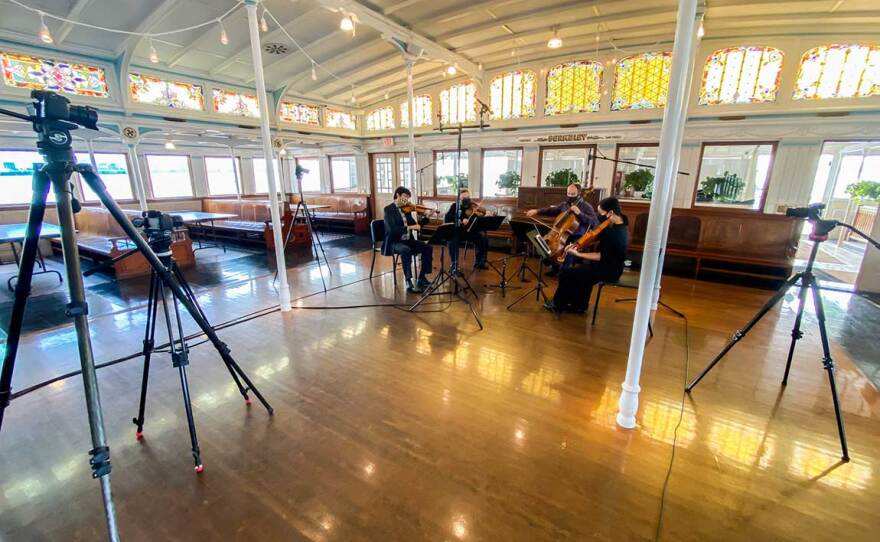It's been a series of stops, starts and everything in between for performing artists this spring, and the musicians in San Diego's Hausmann Quartet are ready to get back to work — in less choppy waters.
The quartet hasn't been able to perform together since their February program aboard the Maritime Museum's Berkeley ship. This Sunday, they'll virtually broadcast a brand new show of classical works from aboard the Berkeley, and finally get to be back on the boat, and back together, albeit without a live audience.
"I think as performers, this is one of the things we’ve been missing the most over the last six months," said cellist Alex Greenbaum. "It’s sort of a real visceral human connection to the people who are there, who are taking time out of their day to share this experience with you. To sort of commune with you in a way."
The group, the official string quartet in residence of San Diego State University, was formed in 2004, and alongside Greenbaum are violinists Isaac Allen and Bram Goldstein, and violist Angela Choong. Their Haydn Voyages series features interesting historical pieces (often from Haydn himself and composers somehow linked to him) performed alongside related or contemporary works on the Berkeley, docked in San Diego's harbor as part of the Maritime Museum.
This show — a shorter program than usual to allow for online audience attention spans — features three works. Kicking things off will be a piece by composer Joseph Bologne, Chevalier de Saint-Georges, "Quartet Concertant in B-flat Major," composed in 1777. De Saint-Georges was one of the first historically noted composers of African descent, and collaborated with Haydn.
The midpoint of the show is a composition by a young Iranian woman, Aftab Darvishi, "Daughters of Sol." The piece, composed in 2017, is hypnotic and haunting, and is inspired by a poem by Ahmad Shamloo.
And closing things out will be a Haydn quartet from later in his career. "One of his last quartets. It’s really amazing," said Greenbaum. "All the things in a lifetime of experimentation, tinkering and traveling that he had in his career, these last few sets of quartets I think really have it all, in terms of all the different tricks and sort of humor, but also sublime, just has this very wonderful longer slow movement, and then also like a really funny middle movement," Greenbaum added.
How is a classical string quartet piece from the late 1700s funny? In some ways it's the timing — think vintage cartoon soundscapes. But from a theory standpoint, a lot of humor in classical music is found in the way a work can build expectations, or dwell within pre-existing expectations, and then defy them. In some works the humor is more of a winked-at subtext, but others, he said, result in audible laughter from audiences, whether from the performance style or from the actual sounds, a sonic whimsy — long, sustained pauses, drastic stops, screech-like noises acting as exclamation points.
Greenbaum said that for a long time, the quartet wasn't even playing music together. While each member of the group has stayed busy — working together remotely on summer chamber music educational programs, or on individual projects and even performing individually — Greenbaum remembers the magic of the first time they gathered since COVID began and rehearsed in June, on Allen and Choong's patio.

The group misses sharing this with the audience, whether it's Haydn's whimsical humor or a haunting poem transformed into music.
"We’re excited to be back in the space," Greenbaum said of the Berkeley, noting that while recording to an empty audience will feel somewhat unsettling, much of it will be familiar. "We’ll get dressed up, we’ll get set up."
Greenbaum also hopes that while the power of the in-person performance has been changed by the pandemic, that the change in access to the arts leaves a lasting impact, making space for new audiences sharing the arts in new ways.
"We have been, as arts consumers, I think really fortunate in a way during this pandemic. So many organizations have put so much really incredible online content out there for free," Greenbaum said. "There was a big trend, especially when the pandemic started, just sort of providing as much to people as possible."
With the shift to online, they set the ticket cost to a "name your own price" model, with a $5 minimum. They have also opened up their video archives to the public, usually passcode-protected for ticket-holding concert attendees.
Selling tickets does provide income, Greenbaum added. "Even though it's a small share, it's not insignificant. We're trying to strike a balance."
Haydn Voyages: Worldly Travelers takes place Sunday at 4 p.m.







